United Nations Conference on Sustainable Development
| United Nations Conference on Sustainable Development Rio+20, Earth Summit 2012 | |
|---|---|
 | |
| Date(s) | 20–22 June 2012 |
| Begins | 20 June 2012 |
| Ends | 22 June 2012 |
| Location(s) | Rio de Janeiro, Brazil |
| Previous event | Earth Summit 1992, Earth Summit 2002 |
| Website | |
| uncsd2012 | |
The United Nations Conference on Sustainable Development (UNCSD), also known as Rio 2012, Rio+20 (Portuguese pronunciation: [ˈʁi.u ˈmajʒ ˈvĩtʃi]), or Earth Summit 2012 was the third international conference on sustainable development aimed at reconciling the economic and environmental goals of the global community. Hosted by Brazil in Rio de Janeiro from 13 to 22 June 2012, Rio+20 was a 20-year follow-up to the 1992 Earth Summit / United Nations Conference on Environment and Development (UNCED) held in the same city, and the 10th anniversary of the 2002 World Summit on Sustainable Development (WSSD) in Johannesburg.
The ten-day mega-summit, which culminated in a three-day high-level UN conference, was organized by the United Nations Department of Economic and Social Affairs and included participation from 192 UN member states — including 57 Heads of State and 31 Heads of Government, private sector companies, NGOs and other groups. The decision to hold the conference was made by UN General Assembly Resolution A/RES/64/236 on 24 December 2009. It was intended to be a high-level conference, including heads of state and government or other representatives and resulting in a focused political document designed to shape global environmental policy.[1]
Background
In 1992, the first conference of its kind, the United Nations Conference on Environment and Development (UNCED), commonly referred to as the Rio Conference or Earth Summit, succeeded in raising public awareness of the need to integrate environment and development. The conference drew 109 heads of state to Rio de Janeiro, Brazil, to address what were dubbed urgent problems of environmental protection and socio-economic development.[2] The Earth Summit influenced subsequent UN conferences, including Rio+20 and set the global green agenda. “The World Conference on Human Rights, for example, focused on the right of people to a healthy environment and the right to development; controversial demands that had met with resistance from some Member States until the Earth Summit.”[3]
Major outcomes of the conference include the United Nations Framework Convention on Climate Change (UNFCCC) —a climate-change agreement that led to the Kyoto Protocol, Agenda 21, the United Nations Convention on Biological Diversity (CBD) and the United Nations Convention to Combat Desertification (UNCCD). It also created new international institutions, among them the Commission on Sustainable Development, tasked with the follow-up to the Rio Conference and led to the reform of the Global Environment Facility.[4]
Ten years later, Earth Summit 2002 informally nicknamed Rio+10 was held in Johannesburg, South Africa with the goal of again bringing together leaders from government, business and NGOs to agree on a range of measures toward similar goals. At Rio+10, sustainable development was recognized as an overarching goal for institutions at the national, regional and international levels. There, the need to enhance the integration of sustainable development in the activities of all relevant United Nations agencies, programs and funds was highlighted. The discussion also encompassed the role of institutions in stepping up efforts to bridge the gap between the international financial institutions and the multilateral development banks and the rest of the UN system.[4]
Major outcomes of that conference include the Johannesburg Declaration and almost 300 international partnership initiatives meant to help achieve the Millennium Development Goals.
Objectives

The conference had three objectives:
- Securing renewed political commitment for sustainable development
- Assessing the progress and implementation gaps in meeting previous commitments.
- Addressing new and emerging challenges.
Conference themes
The official discussions had two main themes:
- How to build a green economy to achieve sustainable development and lift people out of poverty, including support for developing countries that will allow them to find a green path for development.
- How to improve international coordination for sustainable development by building an institutional framework.
Rio+20
In the months leading up to the beginning of the conference, negotiators held frequent informal consultations at UN headquarters in New York City, and in the two weeks before the conference was scheduled to begin, they managed to reach consensus on the sensitive language in the then proposed outcome document for the summit.[5]
Billed as the biggest UN event ever organized—with 15,000 soldiers and police guarding about 130 heads of state and government, from 192 countries, and the more than 45,000 individuals gathered in Rio de Janeiro—the 10-day mega-conference was intended to be a high-level international gathering organized to re-direct and renew global political commitment to the three dimensions of sustainable development: economic growth, social improvement and environmental protection; focusing on reducing poverty while promoting jobs growth, clean energy and more fair, sustainable uses of resources; goals first established at Earth Summit in 1992.[1][6] [7]
The conference centered around Agenda 21, the outcome document from Earth Summit 1992. That document was considered revolutionary in that it essentially created the term sustainable development and created the global environmental agenda for the next 20 years. The representatives of participating governments gathered in Rio to discuss what was then the draft text of the outcome document.
Rio+20 sought to secure affirmations for the political commitments made at past Earth Summits and set the global environmental agenda for the next 20 years by assessing progress towards the goals set forth in Agenda 21 and implementation gaps therein, and discussing new and emerging issues. [8] The UN wanted Rio to endorse a UN "green economy roadmap", with environmental goals, targets and deadlines, whereas developing countries preferred establishing new "sustainable development goals" to better protect the environment, guarantee food and power to the poorest, and alleviate poverty.[9]
Rio+20 attracted many protests, and more than 500 parallel events, exhibitions, presentations, fairs and announcements as a wide range of diverse groups struggled to take advantage of the conference in order to gain international attention. The British online newspaper, The Guardian reported that, “Downtown Rio de Janeiro was partly shut-down as an estimated 50,000 protesters, some of whom were naked, took to the streets.”[10]
Participation
A few key global leaders—mostly G20 leaders and namely United States President Barack Obama, German Chancellor Angela Merkel, and UK Prime Minister David Cameron—did not attend the conference and blamed their absence on the ongoing European sovereign-debt crisis. Their collective absence was seen as a reflection of their administrations’ failure to prioritize sustainability issues.[11]
"In not attending, the prime minister is sending out a powerful signal that the UK government does not see sustainability as a priority", Joan Walley, chair of the UK environmental audit committee said to The Guardian.
Calendar of meetings
1st Preparatory Committee
Held from 16–18 May 2010, immediately after the conclusion of the eighteenth session and the first meeting of the nineteenth session of the Commission on Sustainable Development.
1st Intersessional
Held from 10–11 January 2011 at UN Headquarters, New York, the Intersessional focused on discussion of the objectives of the conference, and its two principle themes. The Intersessional – not a negotiation session – featured panel discussions, from academia, non-governmental organizations as well as Delegates and UN system representatives.
2nd Preparatory Committee
Held from 7–8 March 2011, at United Nations Headquarters in New York, immediately following the Intergovernmental Policy Meeting for the 19th Session of the Commission on Sustainable Development.[12]
2nd Intersessional
Held from 15–16 December 2011 at United Nations Headquarters in New York.[13]
3rd Intersessional
Held from 5–7 March 2012 at United Nations Headquarters in New York.[14]
United Nations Conference on Sustainable Development
The 3rd Preparatory Committee began on 13 June 2012 in Rio de Janeiro, Brazil, and ended on 15 June 2012, marking the start of the UN Conference on Sustainable Development.[15] The talks were held from 20–22 June 2012 in Rio de Janeiro, Brazil.[16] [17] The conference was expected to draw 50,000 participants, including delegates, environmental activists, business leaders, and indigenous groups. Additionally, about 130 heads of state from around the world were expected to be present for the final three days of the summit.[18]
Outcomes
The primary result of the conference was the nonbinding document, "The Future We Want," a 49-page work paper.[8] In it, the heads of state of the 192 governments in attendance renewed their political commitment to sustainable development and declared their commitment to the promotion of a sustainable future. The document largely reaffirms previous action plans like Agenda 21.[19]
Some important outcomes include the following:
“The text includes language supporting the development of Sustainable Development Goals (SDGs), a set of measurable targets aimed at promoting sustainable development globally. It is thought that the SDGs will pick up where the Millennium Development Goals leave off and address criticism that the original Goals fail to address the role of the environment in development.”[20]
The attempt to shore up the UN Environment Programme (UNEP) in order to make it the “leading global environmental authority”[19] by setting forth eight key recommendations including, strengthening its governance through universal membership, increasing its financial resources and strengthening its engagement in key UN coordination bodies.
Nations agreed to explore alternatives to GDP as a measure of wealth that take environmental and social factors into account in an effort to assess and pay for ‘environmental services’ provided by nature, such as carbon sequestration and habitat protection.[21]
Recognition that "fundamental changes in the way societies consume and produce are indispensable for achieving global sustainable development.” EU officials suggest it could lead to a shift of taxes so workers pay less and polluters and landfill operators pay more.
The document calls the need to return ocean stocks to sustainable levels “urgent” and calls on countries to develop and implement science-based management plans.[19]
All nations reaffirmed commitments to phase out fossil fuel subsidies.
In addition to the outcome text, there were over 400 voluntary commitments for sustainable development made by Member States.
At the African Ministerial Conference on the Environment, 40 African countries agreed to implement "The Future We Want."[22]
Leaders in attendance
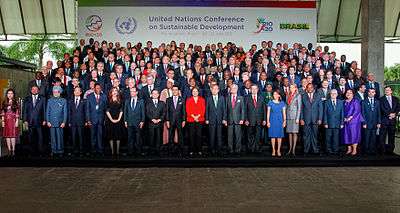
-
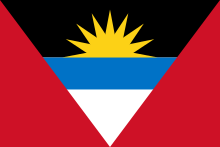 Antigua & Barbuda – Prime Minister Baldwin Spencer[23]
Antigua & Barbuda – Prime Minister Baldwin Spencer[23] -
 Argentina – President Cristina Fernández de Kirchner[24]
Argentina – President Cristina Fernández de Kirchner[24] -
 Australia – Prime Minister Julia Gillard[25]
Australia – Prime Minister Julia Gillard[25] -
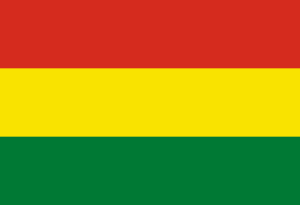 Bolivia – President Evo Morales,[26] see Bolivian government proposal Harmony with nature
Bolivia – President Evo Morales,[26] see Bolivian government proposal Harmony with nature -
 Brazil – President Dilma Rousseff[26]
Brazil – President Dilma Rousseff[26] -
 Bulgaria – President Rosen Plevneliev
Bulgaria – President Rosen Plevneliev -
 China - Premier Wen Jiabao[27]
China - Premier Wen Jiabao[27] -
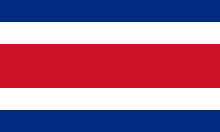 Costa Rica - President Laura Chinchilla Miranda[25]
Costa Rica - President Laura Chinchilla Miranda[25] -
 Denmark - Prime Minister Helle Thorning-Schmidt[25]
Denmark - Prime Minister Helle Thorning-Schmidt[25] -
 Ecuador - President Rafael Correa[28]
Ecuador - President Rafael Correa[28] -
 France - President Francois Hollande[29]
France - President Francois Hollande[29] -
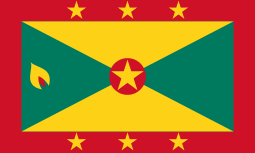 Grenada - Prime Minister Tillman Thomas[30]
Grenada - Prime Minister Tillman Thomas[30] -
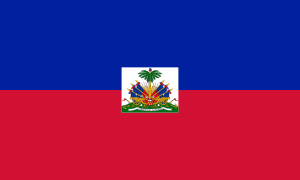 Haiti - President Michel Martelly[31]
Haiti - President Michel Martelly[31] -
 India - Prime Minister Manmohan Singh[27]
India - Prime Minister Manmohan Singh[27] -
 Indonesia - President Susilo Yudhoyono[30]
Indonesia - President Susilo Yudhoyono[30] -
 Iran - President Mahmoud Ahmadinejad[25]
Iran - President Mahmoud Ahmadinejad[25] -
 Lithuania - President Dalia Grybauskaitė
Lithuania - President Dalia Grybauskaitė -
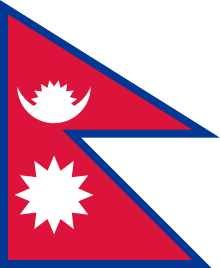 Nepal - Prime Minister Baburam Bhattarai[32]
Nepal - Prime Minister Baburam Bhattarai[32] -
 Nigeria - President Goodluck Jonathan[33]
Nigeria - President Goodluck Jonathan[33] -
 Norway - Prime Minister Jens Stoltenberg[34]
Norway - Prime Minister Jens Stoltenberg[34] -
 Portugal - Prime Minister Pedro Passos Coelho[35]
Portugal - Prime Minister Pedro Passos Coelho[35] -
 Russia – President Dmitry Medvedev[26]
Russia – President Dmitry Medvedev[26] -
 South Africa - President Jacob Zuma[36]
South Africa - President Jacob Zuma[36] -
 South Korea - President Lee Myung bak[37]
South Korea - President Lee Myung bak[37] -
 Spain - Prime Minister Mariano Rajoy[38]
Spain - Prime Minister Mariano Rajoy[38] -
 Sri Lanka - President Mahinda Rajapaksa[39]
Sri Lanka - President Mahinda Rajapaksa[39] -
 Sweden - Prime Minister Fredrik Reinfeldt[40]
Sweden - Prime Minister Fredrik Reinfeldt[40] -
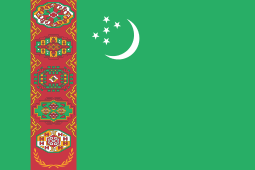 Turkmenistan – President Gurbanguly Berdimuhamedow
Turkmenistan – President Gurbanguly Berdimuhamedow -
 Uruguay - President Jose Mujica[28]
Uruguay - President Jose Mujica[28] -
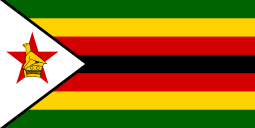 Zimbabwe - President Robert Mugabe[38]
Zimbabwe - President Robert Mugabe[38]
among others Also present were:
- Carl XVI Gustaf, King of Sweden
- Albert II, Prince of Monaco
- Henri, Grand Duke of Luxembourg
- José Manuel Barroso, the President of the European Commission
(look at the official photo of the summit)
Controversies
Environmental and Indigenous Rights Activists
Activists took initiative at Rio+20 by staging numerous loud protests, and making their voices heard. Numbered in the thousands, these activists joined forces to stand up to what they considered exploitation and degradation of the Earth, as well as the negation of the rights of indigenous peoples. This group is ever more relevant in Brazil as deforestation threatens Amazonian ethnic groups everyday.[41]
In addition to holding signs and shouting chants, the crowds took a theatric route to convey their messages. Firstly, they poked at Brazilian President Dilma Rousseff, claiming she has given in to the global North’s corporate hand.[42] Rousseff's controversy has arisen over her steadfast desire to further industrialize Brazil, and its economy. Additionally, the crowds assembled for a ritual and symbolic "tearing up" of the plenary's negotiated text,[43] conveying their disapproval.
Thousands of non-governmental organizations (NGOs) gathered at the Flamengo Park in Rio. They criticized the draft negotiating text, particularly for its failure to mention planetary boundaries or nuclear energy, in light of the Fukushima disaster in Japan.[8] Organizations, such as Greenpeace and the World Wide Fund for Nature, as well as members of indigenous communities, activists and artists participated. The Danish artist Jens Galschiøt, the leader of the group AIDOH, and the Group 92 used his Freedom to Pollute sculptures to focus on global warming and its resulting increased flow of refugees. About 20,000 flyers about Freedom to Pollute were distributed during Rio+20 and a related television program was produced in Denmark.
Ahmadinejad Visit to Rio
There was some controversy over Iran's involvement in the Rio+20 conference. Iran sent a delegation, which included President Ahmadinejad, to Rio in June to attend the summit.[44][45] The controversy of Iranian attendance at the summit surrounds the fact that Iran has serious environmental issues, which it has refused to address, continuing human rights violations and is refusing to cooperate with the IAEA over its contentious nuclear program.[46] Ahmadinejad was met with demonstrations, attended by thousands of people, on his arrival in Rio.[47][48] The Iranian delegation were met with protesters waving banners with the slogan “Ahmadinejad go home” on their arrival in Rio on 20 June.[49]
Participation by Civil Societies
During RIO +20 event and preparatory events UNCSD had given ample opportunities to various stakeholders to contribute towards Rio +20 and Civil Societies had taken part in various sphere including organizing side events, promoting the RIO event, submitting literature and also helped the rio secretariat with translation work.The logo and promotion of RIO +20 was available in languages used in United Nations however Civil societies took part in producing the logo image and literature in other local and National languages.[50]
See also
- Earth Summit
- Durban III The conference opened on 22 September 2011
- Planetary boundaries
- Sustainable Development Goals
References
- 1 2 "Rio+20 - United Nations Conference on Sustainable Development". Uncsd2012.org. 2012-06-22. Archived from the original on August 18, 2014. Retrieved 2014-08-04.
- ↑ "United Nations - Earth Summit+5". Un.org. 1997-06-27. Retrieved 2014-08-04.
- ↑ "Earth_Summit". Un.org. Retrieved 2014-08-04.
- 1 2 "Rio+20 - United Nations Conference on Sustainable Development". Uncsd2012.org. 2011-07-29. Retrieved 2014-08-04.
- ↑ "Agreement Reached on Weakened Outcome Text as Leaders Arrive for Rio Summit | International Centre for Trade and Sustainable Development". Ictsd.org. 2014-07-31. Retrieved 2014-08-04.
- ↑ "Archived copy". Archived from the original on August 25, 2012. Retrieved August 4, 2012.
- ↑ Archived July 24, 2012, at the Wayback Machine.
- 1 2 3 Gerhardt, Tina (20 June 2012). "Rio+20 Kicks Off". The Progressive.
- ↑ Vidal, John (19 June 2012). "Rio+20: Earth summit dawns with stormier clouds than in 1992". The Guardian. London.
- ↑ "Rio+20 summit opens amid protests – video". The Guardian. London. 21 June 2012.
- ↑ Vidal, John (11 June 2012). "David Cameron criticised for skipping Rio+20 Earth summit". The Guardian. London.
- ↑ "Rio+20 - United Nations Conference on Sustainable Development". Uncsd2012.org. 2012-06-22. Retrieved 2014-08-04.
- ↑
- ↑
- ↑ UNCSD. "3rd Preparatory Committee".
- ↑ UNCSD (2012). "United Nations Conference on Sustainable Development or Rio+20".
- ↑ Romero, Simon (16 May 2012). "Brazil's Leader Faces Defining Decision on Bill Relaxing Protection of Forests". The New York Times.
- ↑ "Giant, 10-day-long UN conference on sustainable development gets underway in Rio de Janeiro". The Washington Post. Associated Press. 13 June 2012. Retrieved 13 June 2012.
- ↑ "Agreement Reached on Weakened Outcome Text as Leaders Arrive for Rio Summit | International Centre for Trade and Sustainable Development". Ictsd.org. 2014-07-15. Retrieved 2014-08-04.
- ↑ Watts, Jonathan; Ford, Liz (23 June 2012). "Rio+20 Earth Summit: campaigners decry final document". The Guardian. London.
- ↑ "At UN-backed conference, African countries adopt sustainable development measures". UN News Centre. September 14, 2012. Retrieved September 16, 2012.
- ↑ "Antigua and Barbuda Contributes to the Outcome of Rio+20". Retrieved 30 April 2013.
- ↑ "CFK arrives in Brazil to take part at Rio +20 Summit". Buenos Aires Herald. June 20, 2012. Retrieved 30 April 2013.
- 1 2 3 4 Gerhardt, Tina (25 June 2012). "Rio+20: A Crisis Is a Terrible Thing to Waste". Huffington Post. Retrieved 30 April 2013.
- 1 2 3 Vaughan, Adam (21 June 2012). "Rio+20 summit: Thursday as it happened". The Guardian. London. Retrieved 30 April 2013.
- 1 2 "Rio+20: All eyes on Manmohan Singh, Wen Jiabao". Times of India. June 20, 2012. Retrieved 30 April 2013.
- 1 2 "From the Green Economy to Communality". Retrieved 30 April 2013.
- ↑ Chrisafis, Angelique (18 June 2012). "Rio+20: France seeks one agenda to end poverty and protect environment". The Guardian. London. Retrieved 30 April 2013.
- 1 2 Tercek, Mark (28 June 2012). "Rio+20: Leadership from New Directions". Huffington Post. Retrieved 30 April 2013.
- ↑ "Haiti - Politic : Speeches of President Martelly to Rio+20". Haiti Libre. Retrieved 30 April 2013.
- ↑ "Rio+20 a generational opportunity' says PM". The Himalayan Times. 22 June 2012. Retrieved 30 April 2013.
- ↑ "Jonathan, Rio 20 and the Environment". This Day. 26 June 2012. Retrieved 30 April 2013.
- ↑ "'Godmother Gro' hailed in Rio". Retrieved 30 April 2013.
- ↑ "World Leaders to Tour Region after G20 and Rio+20". Americas Quarterly. Retrieved 30 April 2013.
- ↑ "South Africa: President Zuma Returns From Rio+20 Conference". 24 June 2013. Retrieved 30 April 2013.
- ↑ "Lee champions green growth at Rio+20 meeting". The Korea Times. 21 June 2012. Retrieved 30 April 2013.
- 1 2 Vaughan, Adam (20 June 2012). "Rio+20 summit: Opening day live blog". The Guardian. London. Retrieved 30 April 2013.
- ↑ "Rio 20 proves a damp squib of a summit". The Sunday Times. June 24, 2012. Retrieved 30 April 2013.
- ↑ "Speech by Prime Minister Fredrik Reinfeldt at Rio +20 Summit on Sustainable Development". Retrieved 30 April 2013.
- ↑ Wallace, Scott. "National Geographic". Environment.nationalgeographic.com. Retrieved 2014-08-04.
- ↑ http://green.blogs.nytimes.com/2012/06/22/megastars-of-the-earth-summit/
- ↑ Jonathan Watts, in Rio de Janeiro. "The Guardian June 21, 2012". Guardian. Retrieved 2014-08-04.
- ↑ "Ahmadinejad, otra vez en América latina - lanacion.com". Lanacion.com.ar. Retrieved 2014-08-04.
- ↑ "Iranian president to attend Rio+20 Conference « Iran Daily Brief". Irandailybrief.com. 2012-05-30. Retrieved 2014-08-04.
- ↑ "Iraniano acredita que Ahmadinejad vem à Rio +20 para mostrar que o Irã tem amigos - GloboNews - Vídeos do Jornal das Dez - Catálogo de Vídeos". G1.globo.com. 2012-05-30. Retrieved 2014-08-04.
- ↑ "Activists walk through Rio, demonstrating against the presence of the Iranian delegation at the summit". Flickr.com. 2012-06-17. Retrieved 2014-08-04.
- ↑ "Activists walk through Rio, demonstrating against the presence of the Iranian delegation at the summit". Flickr.com. 2012-06-17. Retrieved 2014-08-04.
- ↑ Rozen, Laura (2012-06-25). "Blame it on Rio? Israeli delegate says Iran's Ahmadinejad waved at them | The Back Channel". Backchannel.al-monitor.com. Retrieved 2014-08-04.
- ↑ "Rio+20 : The Seventh issue of the magazine". Uncsd2012.org. 2012-04-11. Retrieved 2014-08-04.
External links
| Wikimedia Commons has media related to United Nations Conference on Sustainable Development - Rio 2012. |
- United Nations Conference on Sustainable Development
- Our Common Future: Report of the World Commission on Environment and Development
- Rio + 20: An Endangered Species?, March/April 2012 journal Environment
- Rio+20 and Sustainable Development: 12 Things to Know Asian Development Bank
- The Future We Want
- Earth Summit 2012
- Only One Earth - the Long Road via Rio to Sustainable Development, the history from Stockholm to Rio by Felix Dodds, Michael Strauss with Maurice Strong
Coordinates: 22°54′35″S 43°10′35″W / 22.9098°S 43.1763°W